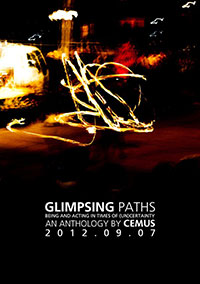The Centre for Environment and Development Studies (CEMUS), is a student-initiated, interdisciplinary centre at Uppsala University, with the explicit ambition to contribute to a more just and sustainable world. Student-faculty collaboration weaves as a golden thread through the history and organization of all activities at the centre.
Since its inception in the early 1990’s, the centre has initiated and expanded the space for transdisciplinary student-led higher education as well as research and collaboration that transcends traditional academic disciplines and boundaries between academia and society at large.
Sign up for CEMUS monthly newsletter here
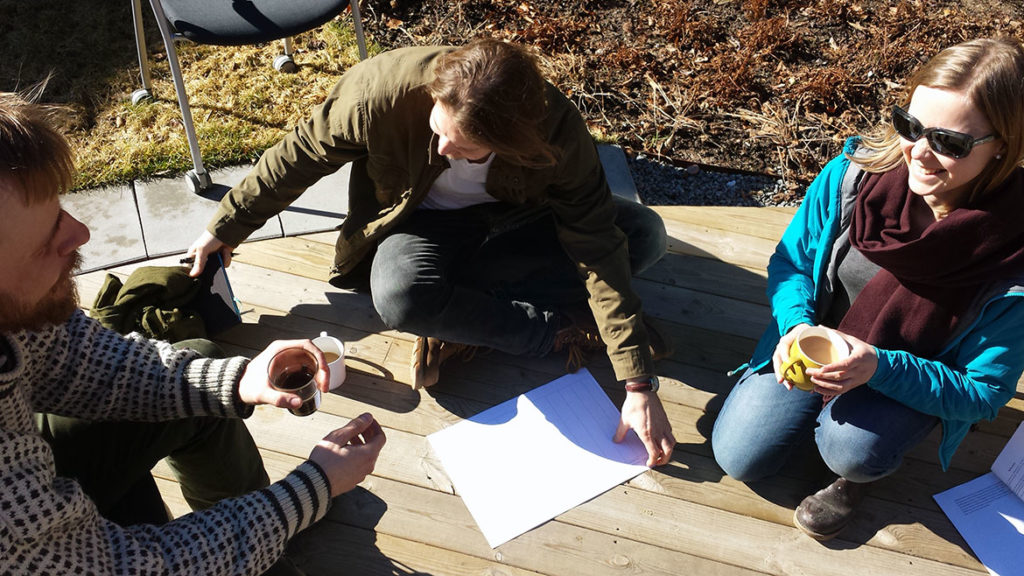
Meeting on internal communication with CEMUS staff March 2016
The education at CEMUS gives you the opportunity to study a wide range of courses within the environment, development and sustainability field. Our transdisciplinary courses aim to complement other courses at Uppsala University and the Swedish University of Agricultural Sciences. They are built on a close collaboration between students, course coordinators, teachers, researchers, university administrators and societal actors. Read more and apply here: www.cemus.uu.se/education
For all general study-related questions concerning courses, contact Study Counselor. For other questions concerning CEMUS Education contact Director of Studies, Sara Andersson.
Transdisciplinary Research
Collaboration with researchers at Uppsala University, the Swedish University of Agricultural Sciences, Swedish and international universities has been one of the key components in student-led education and outreach activities at CEMUS since the very beginning. Researchers are engaged as guest lectures and in course work groups. CEMUS board has since the start of the centre in 1997 also included researchers from all faculties at Uppsala University and SLU. At www.cemus.uu.se/research you find research partners that we are working with at the moment.
For questions on research collaboration and partnerships please contact CEMUS Director, Mikael Höök.
CEMUS Forum and outreach organizes open events and activities in collaboration with students and various actors in the local and international community. The events are open to all and bring together students, researchers, local actors and the interested public. The format varies from events happening once or twice such as lectures, workshops, seminars, film screenings, to reoccurring series, conferences, symposiums and festivals organized with different partners. We also bring together different local organizations and support more long-term student projects, and host different meeting places in Uppsala. The aim with CEMUS Forum is to bridge the gap between the theoretical and practical, the younger and older generations, and the academic and non-academic perspectives, and contribute to a better, more sustainable and just world. Read more about CEMUS Forum here: www.cemus.uu.se/outreach and open events here: www.cemus.uu.se/calendar.
Contact Daniel Mossberg, Lead Coordinator CEMUS Forum and Outreach, with your questions.
The history of CEMUS – How it all started
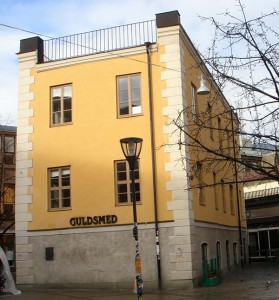
Celsiushuset was home to CEMUS between 1996-2006.
Read more about CEMUS Education
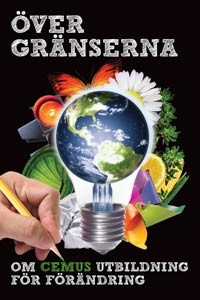 Över gränserna – Om CEMUS utbildning för förändring
Över gränserna – Om CEMUS utbildning för förändringCentrum för miljö- och utvecklingsstudier, CEMUS, är något så ovanligt som ett studentinitierat och studentdrivet universitetscentrum med den uttalade målsättningen att bidra till en bättre värld. I över 15 år har CEMUS erbjudit tvärvetenskaplig utbildning och en kreativ mötesplats för studenter, doktorander, forskare och lärare vid Uppsalas båda universitet. I denna antologi reflekterar tolv CEMUS-anknutna studenter, lärare och forskare över verksamhetens framväxt, grundtankar, utmaningar och framtidsutsikter. Boken ger både möjlighet till kritisk reflektion och inspiration för nuvarande anställda och studenter, liksom andra med intresse för utbildning för hållbar utveckling och Cemus modell. Ladda ner boken här: Över gränserna – Om CEMUS utbildning för förändring
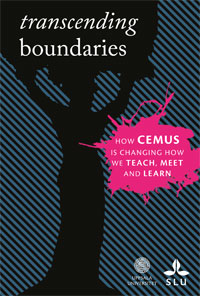 Transcending Boundaries – How CEMUS is Changing How we Teach, Meet and Learn
Transcending Boundaries – How CEMUS is Changing How we Teach, Meet and Learn
Can the experiences gained at CEMUS somehow be converted to expand ongoing debates? Can these experiences be shared and spread to universities in other parts of the world? How should the university be changed? What is education for? How will CEMUS continue to contribute to a sustainable and just society? An anthology written by students, researchers, and teachers aims to answer, in some ways, the questions raised above. It also serves as a source of inspiration and motivation for teachers, university management, administrators, the public, and other actors with an interest in education for sustainable development. The book can be downloaded here: Transcending Boundaries – How CEMUS is Changing How we Teach, Meet and Learn
Blog post and comment by Steven Volk from Oberling College on CEMUS and the relevance for liberal arts education.Read more here: The CEMUS Project – Lessons for Oberlin?
Igniting a Learning Revolution: Student-Run Higher Education for Sustainable Development
“Making a switch to sustainable development requires deep, structural transformation in our economic, cultural, and technological systems. We need new ways of interpreting, analyzing, and understanding the world, and we need new tools to help us deal with tumultuous changes and an uncertain future. If higher education is to play a meaningful role in this undertaking, then we will need to reshape its institutions, pedagogy, and organization.”
Stoddard, Rieser, Andersson & Friman
Read more in the Solutions Magazine article here: Igniting a Learning Revolution: Student-Run Higher Education for Sustainable Development
Glimpsing Paths – Being and Acting in Times of (Un)certainty
What does it mean, and how is it like, to live and act in times of increased uncertainty? This anthology tries to explore those questions with contributions from a wide range of people, including researchers, politicians, students and artists, and in a wide range of formats, from research articles, short stories, poems and visual art. Download the book here: Glimpsing Paths – Being and Acting in Times of (Un)certainty.
From the foreword:
There is no such thing as a value-free narrative. No writing can ever be divorced from value. Depending on one’s frame of reference, the same thing can be described in innumerous different ways. An oak tree can be a living creature with whom you have a relationship and history, a dead resource awaiting effecient use in the global economy, or an anonymous number in an ecologist’s equation. Each narrative has its own premises – unspoken decisions about what to include and what to exclude, what is to be regarded as important and what is not. The same is, of course, true for sustainable development. Sustainable development is alternatively framed as mainly a cultural, political, technological or even economic issue – or, as all of the above.
CEMUS is now a centre at Uppsala University from October 1, 2023
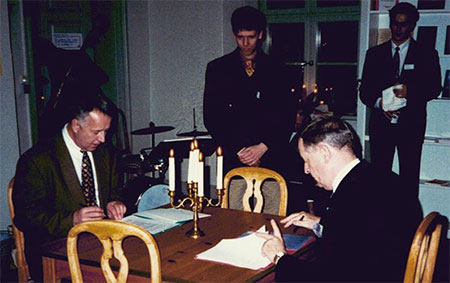
Vice-chancellors Stig Strömholm, Uppsala University, and Thomas Rosswall, The Swedish University of Agricultural Sciences, signs the agreement to establish The Centre for Environment and Development Studies in Uppsala, CEMUS, December 13, 1996, at the traditional Lucia-firandet at Celsiushuset, Svartbäcksgatan 9. Standing next to the table one the founding students, Magnus Tuvendal can be seen.
The Swedish University of Agricultural Sciences, SLU in Uppsala, was already present at the start of CEMUS as a centre, with the cooperation agreement between Uppsala University and SLU signed by the vie-chancellors of both universities in December 1996. This all took place in the Celsius House, the yellow house across the pedestrian street, which CEMUS had recently moved into. CEMUS was formally established as a centre for both universities with its organizational base at Uppsala University from January 1, 1997. There are many people we could mention who have made outstanding and important contributions to CEMUS and SLU over these years, but with the risk of omitting someone, we do not list a complete directory here – you know who you are and what you have meant to us! We hope to maintain all these good relationships with you and establish new contacts with new generations of students, teachers, and researchers at SLU.
Are you, your organization, educational institution, or department interested in more project-based or in-depth collaborations? Please contact CEMUS director Mikael Höök mikael.hook@geo.uu.se, CEMUS director of studies Sara Andersson sara.andersson@cemus.uu.se or CEMUS lead outreach coordinator Daniel Mossberg daniel.mossberg@cemus.uu.se.
CEMUS nu en centrumbildning vid Uppsala universitet från 1 oktober 2023
Efter nästan 27 år som centrumbildningspartner tackar vi SLU och dess engagerade studenter, lärare och forskare för den här tiden. Vi bygger nu vidare på alla lärdomar och erfarenheter och satsar på att utveckla CEMUS svenska och internationella kontakter.
Sveriges lantbruksuniversitet, SLU i Uppsala, fanns med redan i starten av CEMUS som centrumbildning, där samarbetsavtalet mellan Uppsala universitet och SLU skrevs under av de båda universitetens rektorer i december 1996. Det hela skedde i Celsiushuset, det gula huset på tvären på gågatan, som CEMUS nyligen hade flyttat in i. CEMUS inrättades formellt som en universitetsgemensam centrumbildning med sin organisatoriska bas på Uppsala universitet från 1 januari 1997. Det finns många personer vi skulle kunna nämna som gjort enastående och viktiga insatser för CEMUS och SLU under dessa år, men med risk att utelämna någon listar vi här inte någon fullständig förteckning – ni vet vilka ni är och vad ni betytt för oss! Vi hoppas kunna bibehålla alla dessa goda relationer till er och knyta nya kontakter med nya generationer av studenter, lärare och forskare vid SLU.
Är du, din organisation, lärosäte eller institution intresserad av mer projektbaserade eller fördjupade samarbeten? Hör dig till CEMUS föreståndare Mikael Höök mikael.hook@geo.uu.se, CEMUS studierektor Sara Andersson sara.andersson@cemus.uu.se eller CEMUS samverkansansvarig Daniel Mossberg daniel.mossberg@cemus.uu.se.
CEMUS wins Uppsala Peace Prize in the category of Sustainable Development
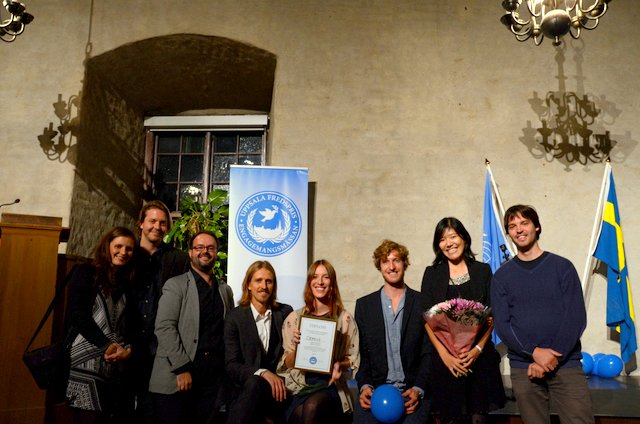 Speech by Carl Lindberg, Chairman of the Uppsala City Council on the Occasion of the Peace Gala on the United Nations Day, 24 October 2015, in the Royal Hall, Uppsala Castle
Speech by Carl Lindberg, Chairman of the Uppsala City Council on the Occasion of the Peace Gala on the United Nations Day, 24 October 2015, in the Royal Hall, Uppsala Castle
Mr. President, Deputy Vice Chancellor, Laureates, other friends, women and men deeply engaged in peace work, human rights and education for sustainable development,
It is with great pleasure that I have received the honorable role of awarding the prize within the category of Sustainable Development. The pleasure is all the greater because I personally think the laureate CEMUS (Centre for Environment and Development Studies) very much deserves this prize. That applies, incidentally to the other award winners.
The jury’s motivation reads:
For their long-term and boundary transcending efforts to foster knowledge about environment and development issues, CEMUS is awarded the Uppsala Peace Prize in the category of sustainable development. Since its inception, CEMUS has distinguished itself for its ability to create engagement among students and to involve local communities in issues related to sustainable development. CEMUS journey from a student initiative to an internationally recognized university center inspires and shows how hard work and dedication can produce ripple-effects, well beyond Uppsala’s borders.
I have had the privilege of following CEMUS development since its starting years after the Rio Conference in 1992 with the evening course Humanity and Nature. CEMUS was created by conscientious and dedicated students and teachers, who sought and received the support of university leaders. Today CEMUS is an international role model in that it is the students and their representatives who run the centre’s activities, which in many other countries would be considered completely utopian or unrealistic. A proof of this was the Swedish government’s decision last spring to nominate CEMUS as Sweden’s candidate in the race for UNESCO’s newly instituted Japan prize for innovative ideas within Education for Sustainable Development. CEMUS has an important catalytic role to encourage and challenge its two heads Uppsala University and the Swedish University of Agricultural Sciences to incorporate sustainable development in their activities. This also applies to CEMUS engagement in the regional center for education for sustainable development, RCE, helping to tie together our schools in the municipality of Uppsala and wider county with our two universities with the ambition to have all educational settings have sustainable development as a guiding principle.
CEMUS will be even more important for the municipality of Uppsala, and Sweden in order for them to be able to contribute to achieving the global goals for sustainable development that the international community through the UN decided on less than a month ago.
CEMUS has great challenges ahead. But I hope that this award can help to inspire further excellent work. CONGRATULATIONS!
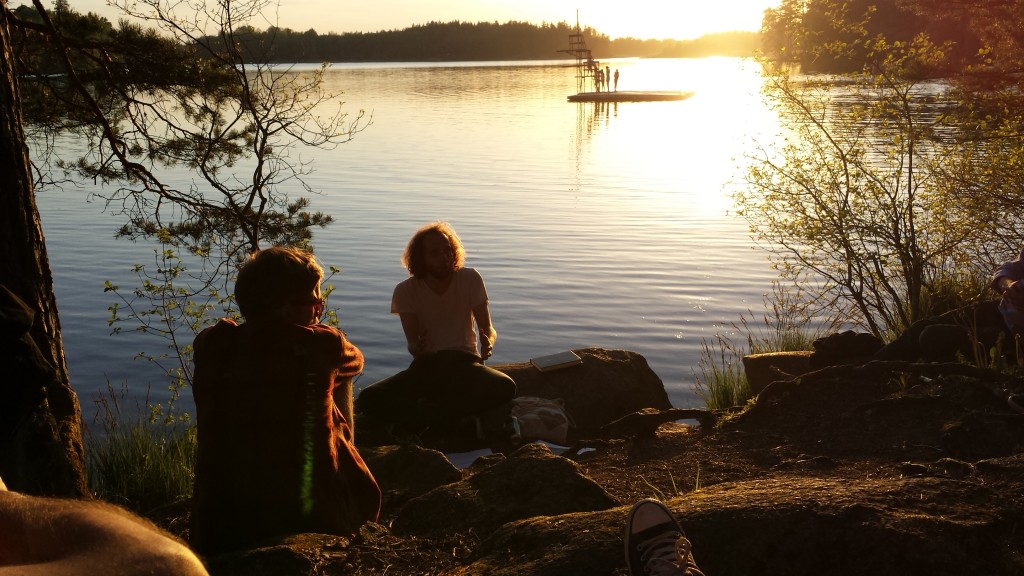
Talk by Dougald Hine by the lake, staff trip to Fjällnora 2014

